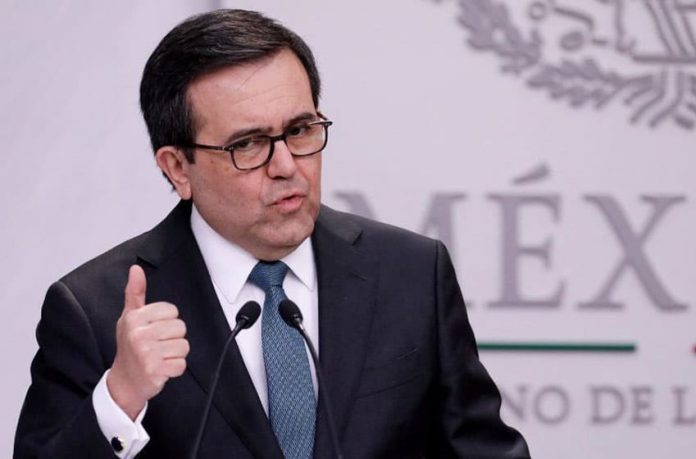Mexico will not change its position regarding the placing of conditions on the negotiation process to reach an updated North American Free Trade Agreement (NAFTA), the economy secretary said yesterday.
“We’ve always believed that NAFTA can’t be conditional upon any other factor outside the negotiation,” Ildefonso Guajardo said during an interview at the official presidential residence, Los Pinos.
His comment came after United States Commerce Secretary Wilbur Ross told a U.S. Senate Committee earlier in the day that metal tariffs imposed on Mexico and Canada on June 1 on national security grounds would be removed if a new trade deal that is favorable to the U.S. is reached.
“Our objective is to have a revitalized NAFTA, a NAFTA that helps America and, as part of that, the [tariffs] would logically go away” for both Canada and Mexico, he said.
Ross also said that United States Trade Representative Robert Lighthizer is optimistic that talks “could pick up steam” after Mexico’s July 1 presidential election.
Canadian Foreign Affairs Minister Chrystia Freeland said last week that the process to renegotiate NAFTA would resume over the summer while her Mexican counterpart Luis Videgaray said Tuesday that he expected the next ministerial NAFTA meeting would be held in July.
Following Guajardo’s lead, the head of Mexico’s technical negotiating team reiterated in two Twitter posts that Mexico would not be pressured into signing a deal due to external factors.
“Mexico has never accepted a link between the steel and aluminum tariffs imposed by the U.S. and the NAFTA negotiation. We will continue to negotiate constructively but never under external pressure or threats,” Kenneth Smith Ramos wrote.
“The only impact that the imposition of steel and aluminum will have on the NAFTA negotiation is to strengthen Mexico’s resolve to ensure that NAFTA 2.0 will prevent the misuse of national security provisions as protectionist tools.”
United States President Donald Trump said Tuesday that progress was being made in NAFTA talks but he didn’t rule out the possibility that the U.S. would seek separate bilateral pacts with Mexico and Canada if a three-way deal couldn’t be reached.
“We’re trying to equalize it. It’s not easy but we’re getting there,” he told a group of small business executives at an event in Washington D.C. “We’ll see whether or not we can make a reasonable NAFTA deal.”
Trump has regularly railed against the 24-year-old trade agreement and has described it as “the worst trade ever made” and a “disaster” for the United States economy.
During his 2016 presidential campaign, he made renegotiating the deal a goal and trilateral talks started in August last year with a scheduled finishing date of December.
But talks have dragged on as the three countries struggle to reach consensus on issues including rules of origin for the automotive sector and a so-called sunset clause which would force a renegotiation of the deal every five years.
The United States’ decision to impose 25% and 10% tariffs on steel and aluminum imports from its neighbors and NAFTA partners was widely seen as a move to increase pressure on the two countries to agree to its demands and was reminiscent of similar hardball tactics that the Trump administration has used previously.
The U.S. president suggested in April that an agreement might be conditional on immigration policy, charging that Mexico “must stop people from going through Mexico and into the U.S.” and he has also threatened on several occasions to terminate the deal.
Mexico quickly rejected linking immigration with NAFTA and has also consistently said that it won’t conduct trade negotiations via social networks.
Freeland said Tuesday the Canadian government believes that an updated deal is still possible while Moisés Kalach, the top international trade official for Mexico’s Business Coordinating Council (CCE), said yesterday that the best way of increasing the chances of concluding a successful new deal is by remaining at the negotiating table.
Source: Notimex (sp), The Canadian Press (en), Reuters (en), El Financiero (sp)
